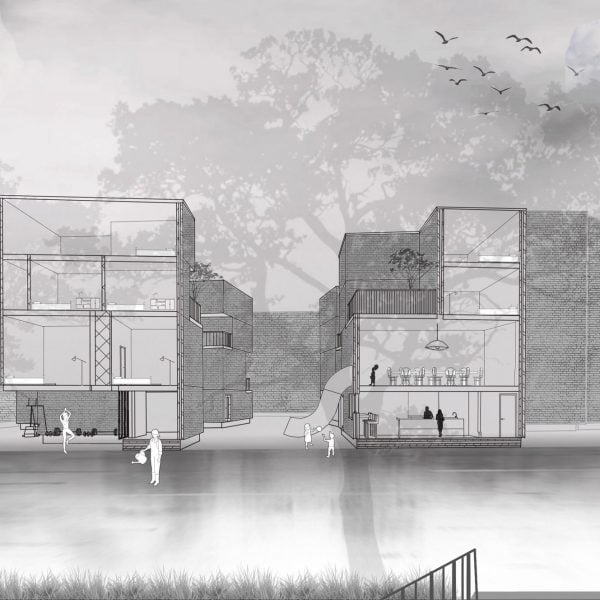Dezeen School Shows: a community centre that is accessible to deaf individuals is included in Dezeen’s latest school show by students at Anglia Ruskin University.
Also included is a pavilion that utilises digital fabrication techniques such as 3D printing and a mixed-use community complex for creatives.
Institution: Anglia Ruskin University
School: Architecture and Planning
Course: BA(Hons) and BSc(Hons) Architecture
Tutors: Maria Vogiatzaki, Leila Davis, Ana Cocho Bermejo, Antonio Blanco Montero, Howard Gilby, Carla Molinari, Alistair Barr, Richard Gatti and Marcel Pereira Cadaval
School statement:
“Why architecture at ARU?
“Study on a course (BA Hons Architecture) developed in line with industry standards, accredited by the Royal Institute of British Architects (RIBA) and Part 1 prescribed by the Architects Registration Board (ARB).
“Expand your knowledge by participating in an optional European field trip each year to cities such as Lisbon, Venice, Rome and Vienna, or applying for one of our Turing Programme summer scholarships to work in Barcelona or study in Venice for four weeks.
“Bring the world of work to life through live briefs – designed and developed with regional employers to give you exposure to ‘real world’ problem-solving.
“Connect and engage with practitioners through our regular extra-curricular workshops, guest lecture series, annual practitioners event, and end of year show.
“Utilise our dedicated studios and workshop facilities to learn how to draw, make models and use all relevant software and digital techniques.
“If you’re fascinated by the built environment, and have ambitions to create spaces that are innovative, meaningful and purposeful, this is the course for you.
“By studying architecture at ARU, you’ll gain the theoretical, technical and design skills to shape the built environment for a sustainable future – and to work as a professional architect.
“As a collaborative individual, you’ll be keen to make connections that will help kick-start your career. We’ll guide you towards the right work experience and support you throughout your course.
“You’ll take part in live brief projects throughout your degree, collaborating with city and borough councils, Timber Development UK, and local and London firms such as Studio Forty, Studio Mai, Stace LLP, Levitt Bernstein, Sheppard & Robson, Barr Gazetas, LSI Architects, Vonberg Architects, RH Partnership Architects, Suzanne Brewer Architects and Aukett Swanke.
“On the BA (Hons) route, you’ll have the option to take a placement year as part of your course to gain valuable work experience.
“We’ll encourage you to go on site visits, where you’ll gain hands-on experience. Our links with professional institutions such as the RIBA Mentoring Programme, as well as local firms, ensure you’ll stay up to date with industry practice.
“As well as benefiting from your lecturers’ knowledge, you’ll also benefit from a network of visiting designers, artists, historians and theorists, plus national and international architects and scholars, focusing on contemporary, relevant themes such as climate change, passive house techniques, fire and safety measures, environmental strategies and social and political challenges.
“Accredited by the Royal Institute of British Architects (RIBA) and prescribed by the Architects Registration Board (ARB), you can be sure that this course will give you skills that reflect emerging technologies and knowledge and will be in demand with employers when you graduate.
“At ARU, we believe it’s important to recognise our students’ hard work. That’s why, at the end of each academic year, we showcase and celebrate your achievements with an end of year show.”
Cross-Cut Pavilion by Jake Cavalla
“The inspiration for the Cross-Cut Pavilion stemmed from a series of hand-crafted models produced at the year’s outset.
“Before tackling the pavilion design, Jake’s cohort was tasked with creating artefacts by hand, exploring spatial form through the repetition and mutation of an element.
“Applying these principles to the pavilion while allowing room for design evolution, Jake employed linear timber elements that rotated and intersected to form his structure.
“He concentrated on key joint details and the craftsmanship of joinery, ensuring both aesthetic appeal and structural integrity.”
Student: Jake Cavalla
Course: BA (Hons) Architecture Year 1
Tutors: Maria Vogiatzaki, Leila Davis and Giacomo Damiani
Email: JC1817[at]student.aru.ac.uk
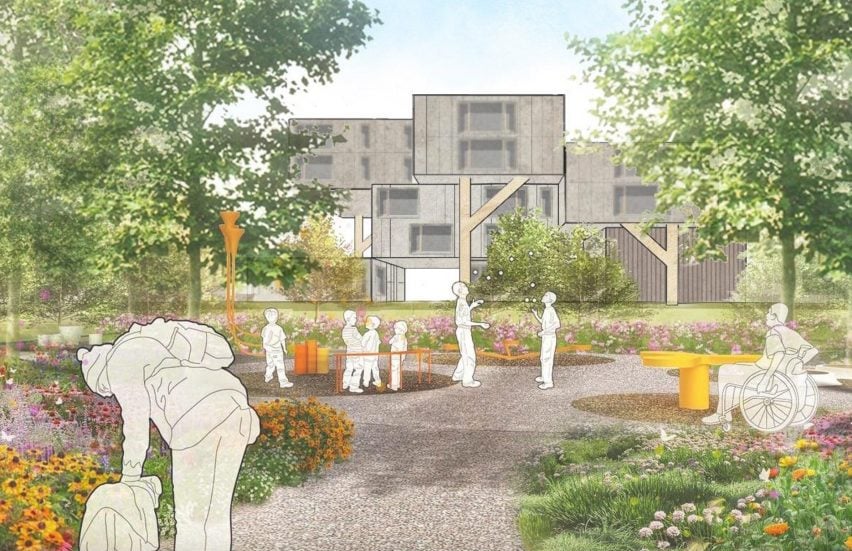
SensAbility by Zainab Yakubu
“This project champions inclusivity by envisioning a cooperative housing development that celebrates diverse abilities.
“It commits to creating a safe, educational haven that welcomes all disabilities.
“The residential units feature co-living spaces with shared communal areas.
“Community bonding is strengthened through public space interventions, including an outdoor theatre that enhances unity, cultural enrichment and wellbeing by offering accessible and inclusive venues for performances.
“Sensory paths cater to diverse needs, promoting engagement and wellbeing, while dense vegetation provides a clear barrier between the sensory.”
Student: Zainab Yakubu
Course: BA (Hons) Architecture Year 2
Tutors: Ana Cocho Bermejo, Antonio Blanco Morena and Howard Gilby
Email: zy152[at]student.aru.ac.uk
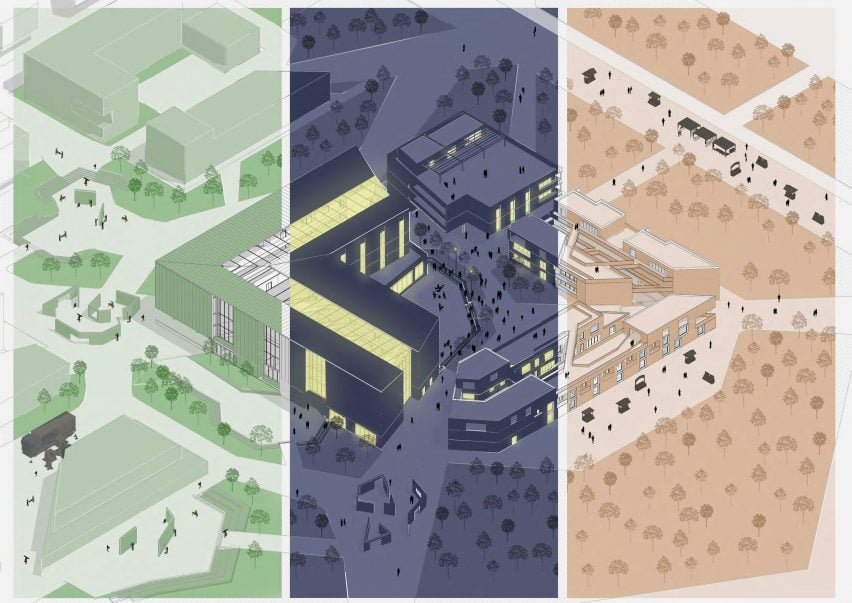
Create by Reece Tapp
“This mixed-use proposal aims to revive and protect Hackney Wick’s creative community by offering spaces for artists and businesses to thrive.
“The project provides affordable housing and workshops, alongside market and retail areas, allowing makers to showcase their talents.
“Key public routes cut through the building, creating natural movement flows that connect public paths and guide people to communal areas.
“These spaces enable visitors and makers to collaborate, enhancing creativity.
“Internal studios, workshops, communal areas and co-working spaces further encourage collaboration and experimentation, with exhibition zones allowing makers to display their works.”
Student: Reece Tapp
Course: BA (Hons) Architecture Year 3
Tutors: Carla Molinari, Alistair Barr, Richard Gatti and Maria Vogiatzaki
Email: rt636[at]student.aru.ac.uk
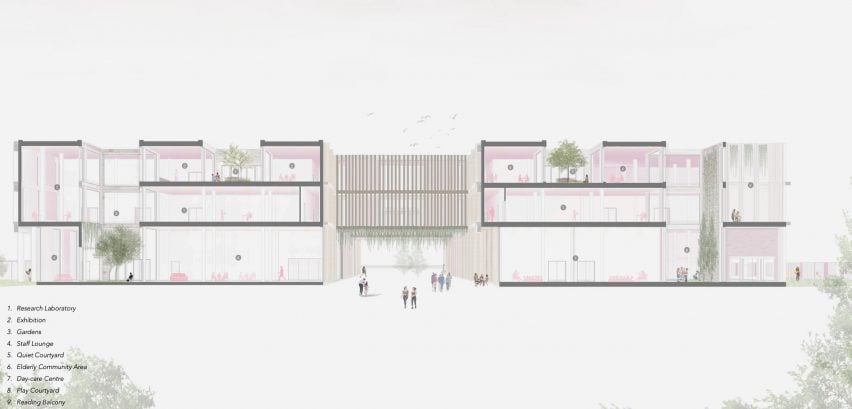
A Myriad of Courtyards: Nature’s Healing Embrace by Nev Seecharran
“A Myriad of Courtyards is a medical facility that redefines traditional healthcare spaces by integrating courtyards, multi-use areas and organic materials to promote wellbeing.
“Courtyards throughout the facility provide natural light, improve air quality and offer green spaces for relaxation and recovery.
“Organic materials like timber and natural stone, chosen for sustainability and warmth, enhance the healing environment.
“By incorporating evidence-based design principles, this project emphasises the connection between humanity and nature, demonstrating how thoughtful architecture can transform healthcare spaces and improve patient outcomes.”
Student: Nev Seecharran
Course: BA (Hons) Architecture Year 3
Tutors: Carla Molinari, Alistair Barr, Richard Gatti and Maria Vogiatzaki
Email: ns991[at]student.aru.ac.uk
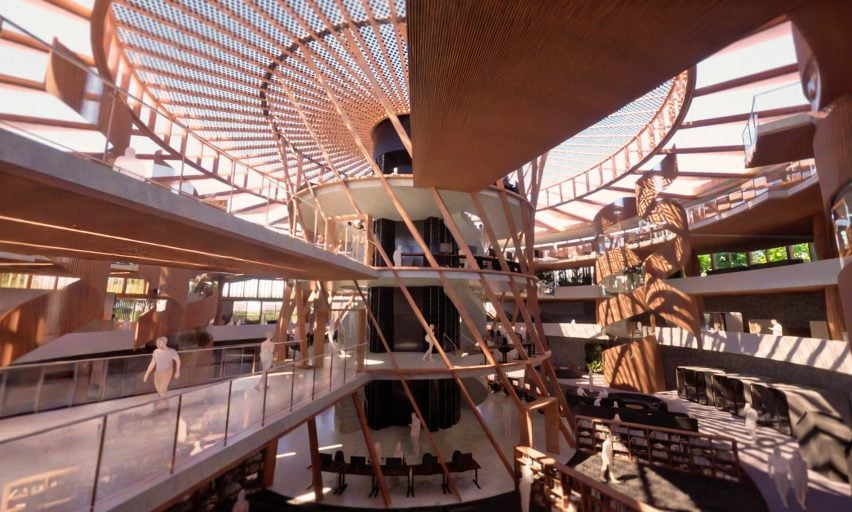
HumanAIse: Preparing for a Future with Artificial Intelligence by Calum Balmain
“HumanAIse is a state-of-the-art facility dedicated to educating and developing essential skills for living and working with AI.
“Serving both local and global communities, it aims to foster curiosity and learning.
“The facility features a localised library with an AI database and onsite learning resources.
“HumanAIse promotes adaptation to the AI era, ensuring that individuals are equipped with the knowledge and skills needed for the future.
“By supporting education and innovation, it contributes to the global understanding and integration of artificial intelligence.”
Student: Calum Balmain
Course: BA (Hons) Architecture Year 3
Tutors: Carla Molinari, Alistair Barr, Richard Gatti and Maria Vogiatzaki
Email: cwjb101[at]student.aru.ac.uk
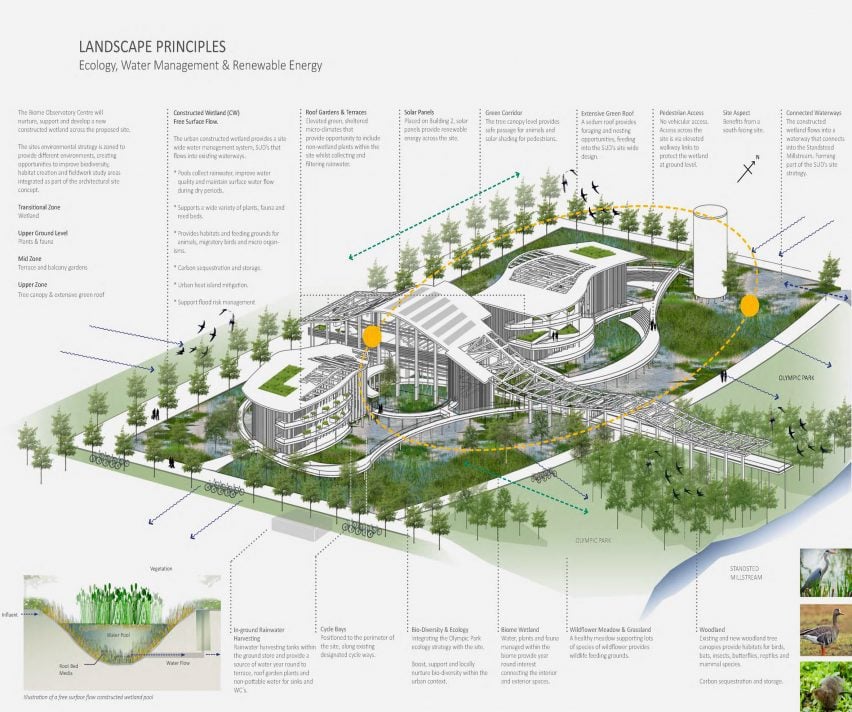
The Biome Observatory by Susan Dean
“The Biome Observatory Centre is a global facility situated in a species-rich urban wetland, supporting international research on urban wetland ecology, ecosystem conservation and habitat development.
“It nurtures biodiversity while encouraging social, community and educational engagement to promote water resilience against climate change.
“The design integrates natural and built environments, featuring elevated walkways, amphitheatres and immersive wetland spaces.
“Sustainable strategies include renewable energy sources and wetland benefits for managing urban heat and water.
“The centre highlights the relationship between architecture and nature, fostering a deeper connection between people and their environment.”
Student: Susan Dean
Course: BA (Hons) Architecture
Tutors: Carla Molinari, Alistair Barr, Richard Gatti and Maria Vogiatzaki
Email: sd1271[at]student.aru.ac.uk
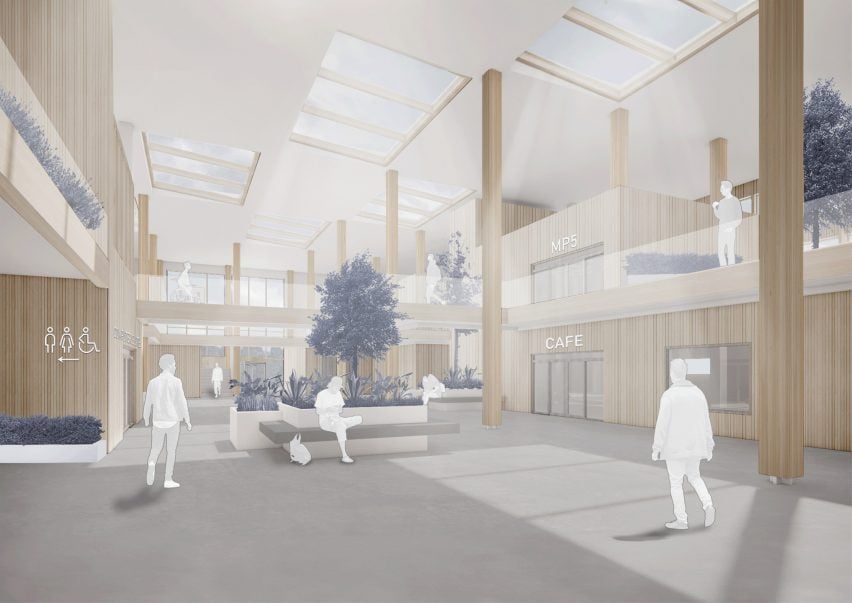
Street to Stability by Jack Newman
“The Street to Stability project envisions a support centre and headquarters for charities, designed to address homelessness.
“It offers comprehensive services, from temporary accommodation to supportive systems like food, counselling, education and training.
“Unlike typical shelters, this facility aims to reintegrate individuals into society, providing comfort, warmth and a sense of belonging.
“By creating spaces that encourage social responsibility and community connection, the project transforms the narrative around homelessness.
“It emphasises the built environment’s role in providing not just shelter but also opportunities for personal growth and reintegration.”
Student: Jack Newman
Course: BA (Hons) Architecture Year 3
Tutors: Carla Molinari, Alistair Barr, Richard Gatti and Maria Vogiatzaki
Email: jn525[at]student.aru.ac.uk
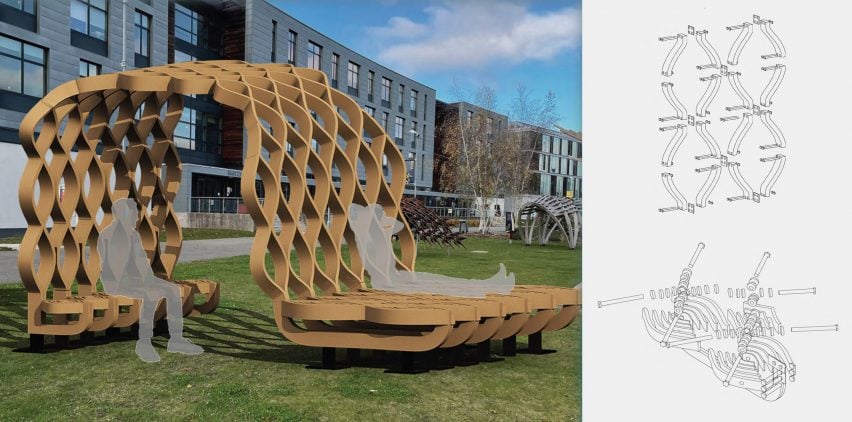
Wavelet Pavilion by Aaron Gethen
“The Wavelet Pavilion showcases a lattice-like configuration applied to a curved wave surface, featuring iterations of almond geometry along its form.
“The pavilion comprises a series of glue-laminated timber elements, assembled with bespoke metal connections.
“The design language is consistently extended to the accompanying bench, maintaining coherence throughout the project.
“The development process was bolstered by both analogue and digital methods with digital fabrication techniques playing a crucial role.
“Utilising 3D modelling software and 3D printing, Aaron gained a deeper understanding of the pavilion’s geometry, ensuring precision in the final models.”
Student: Aaron Gethen
Course: BA (Hons) Architecture Year 1
Tutors: Maria Vogiatzaki, Leila Davis and Giacomo Damiani
Email: AG1576[at]student.aru.ac.uk
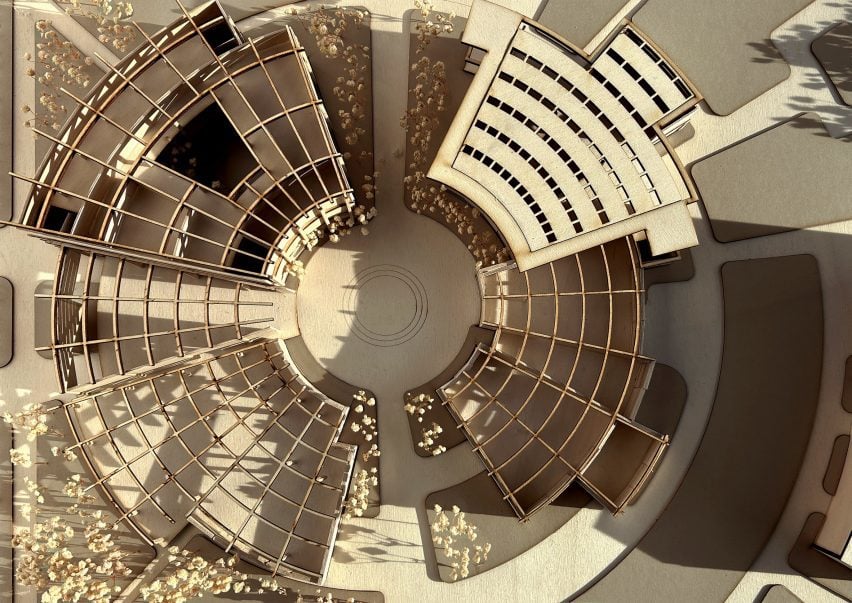
Silent Harmony by Graciela Subba
“Silent Harmony is a community centre designed for deaf and hard of hearing individuals, fostering interaction and collaboration within an accessible environment.
“The project emphasises multi-sensory elements to enhance the experience for those with impaired senses.
“It offers workshops on various skills, including BSL, speech therapy and legal rights, as well as arts, pottery and dance classes.
“This encourages engagement, reduces isolation and addresses mental health issues.
“The centre aims to raise awareness about hearing loss, combatting stigma and stereotypes and providing a platform for these individuals to find their place in society.”
Student: Graciela Subba
Course: BA (Hons) Architecture Year 3
Tutors: Carla Molinari, Alistair Barr, Richard Gatti and Maria Vogiatzaki
Email: gas142[at]student.aru.ac.uk
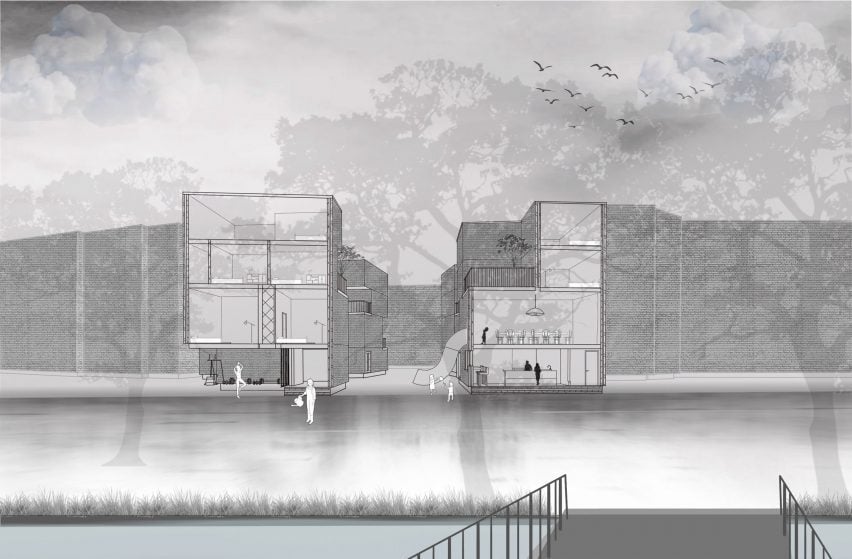
Farms for the Future by Shanice Baxter
“Food security is under threat from climate change and rising living costs.
“This project educates residents about these issues and encourages them to grow their own food through a network of community-managed micro-allotments.
“Specialists in food preservation, climate change and environmental protection will collaborate to promote self-sufficiency, wildlife conservation and floodplain resilience.
“Additionally, a public garden with a new pathway will connect the Salvation Army to the River Chelmer, offering public amenities and accessible housing for people with disabilities.
“The project fosters community involvement in food security and environmental awareness.”
Student: Shanice Baxter
Course: BA (Hons) Architecture Year 2
Tutors: Ana Cocho Bermejo, Antonio Blanco Morena and Howard Gilby
Email: skb171[at]student.aru.ac.uk
Partnership content
This school show is a partnership between Dezeen and Anglia Ruskin University. Find out more about Dezeen partnership content here.
